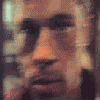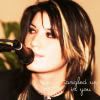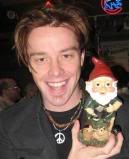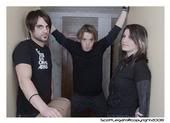
Story by: Ilsabe O´Connell
When Emma Anzai grabs her custom Warwick bass and starts digging into one of the turbulent opening riffs of a Sick Puppies song, the only thing surrounding the Australian-born rocker that’s „quiet“ is her confidence. She’s clear about her priorities, that her bass lines are there to serve the song, that she stays in accord with the other two members of the band (singer/guitarist Shimon Moore and drummer Mark Goodwin). Anzai applies herself with steady mental focus (albeit with aggressive physical energy), paying no attention whatsoever to the fact that a few unschooled members of the audience may have sized her up moments ago as one of the other band members girlfriends. No worries. They’ll figure things out soon enough.
Anzai’s talent as a bass guitarist, however, is unmistakable. It has earned her an endorsement with Warwick, as well as a large and loyal fan base. Yet, as she reveals in this interview, industry success means, above all, more opportunities to have at a common goal - hard, honest rock.
Tell me about how you got started in music. You played guitar first, right?
When I started picking up an instrument, it was guitar, because that was easiest to get your hands on. I was living with my parents in Japan at the time, and I didn’t like it. I didn’t know anybody. . .so I got into music at that point. I had an electric guitar that came with the whole package, you know, the amp, a strap and a tuner.
How disciplined were you about practicing?
It wasn’t a chore, I just really wanted to. I remember being in class waiting to get back home to play it, kind of like an addiction. I didn’t have a lot of time to do it. We lived in these small apartments and mostly I couldn’t turn the amp on, so if there was a window of opportunity to play with the amp on, I kind of savored it. I wanted to do it all the time.
What led you to playing bass guitar instead?
At first it was more a practical thing. When I met Shim at school, he played guitar and sang. I just wanted to play with other people, to be in a band, so it didn’t really matter what I was doing. I decided to play bass, because that was the next thing to do. Luckily, I liked it and didn’t really want to play guitar after that, so it definitely worked out for the best.
When you moved to the US, you didn’t bring along a drummer. Was it difficult finding one you felt comfortable with?
Just Shim and I and our manager came over. We advertised (for a drummer -- i.o.) on Craig’s List and other places. That’s how Mark Goodwin heard of us. He was about the fourth guy in that day. It came down to him because he gelled the best, and also as a person. He’s been with us a couple of years now. We’ve grown more together. He’s one of us in that he wasn’t schooled or trained, but plays by feel. Shim and I never really got lessons when we went to school. We just did it for the love of it and we found Mark, who is the same sort of person. We were lucky there.
Does living in LA influence your writing and ideas?
We take in a little bit, whatever’s good about it. I like it here, the weather, the fact that you can just drive around and sort of be by yourself and have your own space. People leave you alone. It’s not like you have to interact. Personally, I like that. But we’re not really here long enough for things to affect us, because we’re always out on tour. We’re only here for a month or two months in the year.
You endorse Warwick bass guitars.
Yup.
Which do you like the best or play most often?
My favorite one is the Streamer Stage I. At the very beginning I had an FNA Jazzman. I played with that one for five years, the only one I had in Australia. When we moved to the US, I was lucky enough to get endorsed by Warwick over here and they are really great, really supportive. I picked up the Streamer Stage I and they made a couple of custom basses for me recently as well. I like the ash body because it’s lighter and I’m not, you know, that big. I need the lighter body on stage because I’m jumping around and, you know, it gets heavy on the shoulders.
Do you ever play 5 string or fretless bass?
I actually haven’t. I think I’d be one for recording with 5-string or fretless, but I don’t actually have any of those. I still consider myself to be working out the 4-string, trying to get around that. I’m pretty happy with that at the moment.
Do you use a pick?
I use a pick most of the time, and at some points in the song I switch to fingers. And I slap a little bit as well.
What new techniques or changes in your playing have developed over time?
In the early days, our band was a little quirkier, a bit more mix‘n´match with our timing and our riffs, etc.. And now it’s a lot more scaled down and focused. I used to slap a lot more before, and I tried to put in heaps of ... well, you know, when you’re younger you want to put everything in, because you want to use what you’ve learned and put it in the song. Right now, playing-wise, I’m more focused. Also, when we recorded the “Dressed Up As Life” album, our producer Antonina Armato helped me to be more consistent, especially when picking. When you record, it has to be as precise as possible. I noticed that I hadn’t been concentrating that much, but now I focus on the consistency and making sure there are no drops or funny little things like that. And I think that has kind of translated back to my live performance. I’m choosing more carefully where to put things like slap and fancy kinds of things, so it serves the song rather than just for the sake of it.
Many people have come to know the band through the “Free Hugs” video that became so popular on youtube.com. The video is very sweet and inspiring. I downloaded your album last night and was a bit surprised at the darkness of it. I actually like it a lot, though. It isn’t depressing. Why do you think that’s the case?
Well, even the song “All The Same”, which was used for Free Hugs video, is not necessarily uplifting. It’s more honest and a little melancholy. It’s a window into the album in a way. As for darkness, you say it works and I think that might be because the lyrics and the content are honest. A lot of people have written and told us this song helped them through some tough times. It deals with personal issues like loss, death, the way you feel about yourself, and a lot of people relate to it. That’s where the connection is made.
Did you write for the album? Or collaborate with others?
Yeah, it’s mainly Shim and I collaborating along with our producers Tim (James -- i.o.) and Antonina. When we first came over here, we wanted actually to learn more about songwriting and develop and hone that craft. We had more people to write with and resources here than in Australia. So we made the most of it, to get that craft up and happening.
What is the process like? How do go from idea to a finished song?
Yeah. . . Shim will come up with a verse and then he’ll be like, “what do you think for the bridge?” Then we’ll jam it out, get a bridge for it, find a riff that we like or a chorus. With me, I like these heavy songs, and so we’ll work on it to make it sound that way. You definitely get to much better songs with a good collaboration.
Let’s talk about performing. You are a very energetic presence on stage. Where does that come from?
It all comes from emotion, I think, but I also like coffee. When I’m tired, I’ll have a little coffee. Well, I have coffee anyway. But when it comes down to it, when we play live, it’s the emotion that fuels it, and a lot of the emotion I have is ... I don’t know, a little bit of anger, the energy that comes from that. It also depends on what the crowd is giving back. You feed off that and vice-versa.
You jumped around a lot on stage and put a lot of physical movement into your playing. Does it contribute to or help the way you play?
Yeah, it’s interesting, that. I actually am more comfortable playing when I’m moving around a lot. If you stand still when you try to play a really heavy or energetic song, it’s difficult, almost like standing in a club with dance music and not being able to tap your foot. It’s hard, because you want to, you want to go with it and the energy it’s giving you. For me, it’s more of a natural thing, rather than not to.
You get a better sense of rhythm using your whole body?
Yeah, definitely. It’s good fun.
You have also worked as an actress. . .
That was a small thing in Australia, a TV show where we played a band in the show. I haven’t done much, though.
Well, don’t forget your intense role in the music video for “My World.” Did the idea to present yourself in such an exposed way come from you? [Anzai plays a character that puts marks on her body to indicate what she hates about herself and wants changed, similar to the way cosmetic surgeons mark patients before surgery -- i.o.].
Yeah, right. We actually spoke to the director and producer and were thinking of what we could do to portray things that people are going through, self-destructive things. And I thought, for women, it’s mainly the image thing, definitely in Western culture with models and magazines. With Shim, his character pays some people, bums, to beat him up. It was like a self-hate, self-destructive thing.
You spend a lot of time with the guys. It must be hard to find time to yourself.
Yeah. On tour, we spend every bit of every day with each other, so off tour we like to go off and do our own thing. When we tour, we have a bus and our space is our bunks, so I definitely like to stay in my bunk and watch a movie or be on the computer. It’s a lot easier when we’re home, because everyone does their own thing.
You do all seem to like each other and get along incredibly well together. . .
Definitely. Shim and I have been together since high school, through thick and thin, through moving and hard decisions, people leaving the band etc.. I think you have to get on with all the people in the band. You have to have the same goal. You can’t have one person with different goals and motives from the others. You have to be three for the same goal and make sure the band is first priority in everybody’s lives. It’s a combination of that and also that we’re like brothers and sisters. Even if things come up, it’s a relationship where we can work things out ... and keep going. We get on pretty well. It’s one of the prerequisites of being a band.
Do you live close to each other?
We actually live in the same apartment. Yeah, we’re very close.
Judging from the internet, you appeal to all kinds of people for different reasons. Some of them single you out as a role model for girls who want to play rock music. Are you comfortable in that role?
I wouldn’t say that I wouldn’t want to be a part of that. At the same time, I didn’t really think about that, either. I got into music because I loved how I felt doing it. And it was just for me. There are a lot of girls, who come up and say they want to play bass, or music, and it’s inspired them to do this or that. I think it’s really great, because there aren’t that many girls in the industry in terms of rock bands. So, if they decide to do it because they saw us, then I’m pretty happy, pretty stoked that it inspired them, for sure.
There are certainly fewer female bass players in rock. . . do you ever feel pressure to prove yourself?
Yeah. In the beginning I didn’t want to think about that, because I was having fun doing it - for me, not for the critics or the people. In terms of having something to prove, you do have the occasional person that - say, you’re walking into the venue - they will assume that you’re the girlfriend of one of the guys in the band. And they’re surprised when you get up there. And, I don’t know, it’s up to them what they want to think. They might think the same thing later, but it’s not really up to us to worry about what they think.
What other bass players do you admire?
I really like Flea from the Chili Peppers, because he represents everything that I want to do. He’s very versatile. He can slap and he’s got great rhythm. He’s also got really great melodies in bass lines. He complements the song, and that’s something that I want to do as well. He can also bust out and do a solo and do the funk thing. I love funk. And he doesn’t seem very schooled. Some players are very technical. He seems like the opposite of that and I kind of come from the same place. So I look up to him for that.
I love Les Claypool of Primus, because of his strange slapping. He kind of made slap cool in a quirky kind of a way. And on the technical side, this guy called Victor Wooten (Bela Fleck & the Flecktones). He’s really progressive, technical, a very good player. Apart from that, I like rock bass players and the bands Silverchair and Green Day and their respective bass players.
Have you had a chance to meet any of the players you like and pick up tips from them in person?
I don’t think I’ve met any of those people! But, oh, I met Bootsy Collins the other night, so that was really cool. I really love his style, too. Completely different style from all those other guys. He’s one of those standalone bass players, who has his own style. Yeah. Pretty cool.
Here's the original link: http://www.warwick.de/modules/news/News ... 1745&cl=EN


















